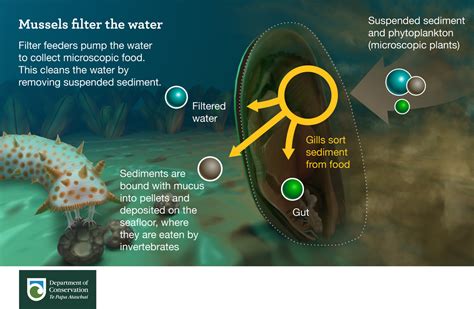Mussels are bivalve mollusks that are found in both saltwater and freshwater environments. They are filter feeders, meaning that they consume food particles suspended in the water. Mussels use their gills to filter out food particles, which they then ingest.

Mussels are very efficient filter feeders, and they can remove a wide variety of particles from the water. This includes solids, such as sand, silt, and clay. Mussels can also filter out bacteria, viruses, and other microorganisms.
The ability of mussels to filter solids has a number of benefits for the environment. Mussels help to clean the water by removing pollutants and nutrients. They also provide food for other animals, such as fish and birds.
Mussels use their gills to filter solids from the water. The gills are made up of a series of thin filaments that are covered in cilia. Cilia are small, hair-like structures that beat back and forth, creating a current of water that flows through the gills.
As the water flows through the gills, the cilia trap food particles. The food particles are then passed to the mouth, where they are ingested.
Mussels can filter a large amount of water in a short period of time. A single mussel can filter up to 20 gallons of water per day. This makes mussels very effective at cleaning the water.
The ability of mussels to filter solids has a number of benefits for the environment. These benefits include:
- Water quality improvement: Mussels help to improve water quality by removing pollutants and nutrients. Pollutants can include bacteria, viruses, and chemicals. Nutrients can include nitrogen and phosphorus.
- Food for other animals: Mussels provide food for a variety of other animals, such as fish and birds. Mussels are a good source of protein and other nutrients.
- Habitat creation: Mussels can create habitat for other organisms. The shells of mussels provide shelter for small fish and invertebrates.
The ability of mussels to filter solids has a number of potential applications. These applications include:
- Water treatment: Mussels can be used to treat wastewater and drinking water. Mussels can remove pollutants and nutrients from the water, making it cleaner and safer to use.
- Aquaculture: Mussels can be used to improve the water quality in aquaculture ponds. Mussels can remove pollutants and nutrients from the water, making it healthier for fish and other aquatic organisms.
- Bioremediation: Mussels can be used to clean up polluted water bodies. Mussels can remove pollutants and nutrients from the water, making it cleaner and safer for humans and wildlife.
Mussels are able to filter solids from the water. This ability has a number of benefits for the environment, including water quality improvement, food for other animals, and habitat creation. Mussels can also be used for a variety of applications, such as water treatment, aquaculture, and bioremediation.
Can mussels filter all types of solids?
No, mussels cannot filter all types of solids. Mussels can only filter solids that are small enough to pass through their gills.
How much water can a mussel filter?
A single mussel can filter up to 20 gallons of water per day.
What are the benefits of mussel filtration?
The benefits of mussel filtration include water quality improvement, food for other animals, and habitat creation.
What are the applications of mussel filtration?
The applications of mussel filtration include water treatment, aquaculture, and bioremediation.
| Characteristic | Value |
|---|---|
| Filtration rate | Up to 20 gallons per day |
| Particle size | 1-100 microns |
| Pollutant removal | Bacteria, viruses, chemicals, nutrients |
| Applications | Water treatment, aquaculture, bioremediation |
| Benefit | Description |
|---|---|
| Water quality improvement | Mussels remove pollutants and nutrients from the water, making it cleaner and safer to use. |
| Food for other animals | Mussels provide food for a variety of other animals, such as fish and birds. |
| Habitat creation | The shells of mussels provide shelter for small fish and invertebrates. |
| Bioremediation | Mussels can be used to clean up polluted water bodies. |
| Application | Description |
|---|---|
| Water treatment | Mussels can be used to treat wastewater and drinking water. |
| Aquaculture | Mussels can be used to improve the water quality in aquaculture ponds. |
| Bioremediation | Mussels can be used to clean up polluted water bodies. |
Tips for Mussel Filtration
- Use mussels that are healthy and active.
- Place mussels in a clean environment with plenty of water flow.
- Feed mussels a variety of food particles.
- Monitor mussels regularly for any signs of stress or disease.
Tricks for Mussel Filtration
- Use a variety of mussel species to improve filtration efficiency.
- Create a biofilm on the mussels to enhance filtration.
- Use mussels in conjunction with other filtration methods.
